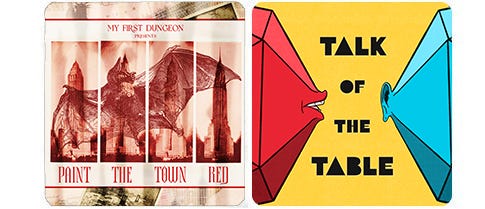For our September Patreon-exclusive game, Shenuque and I sat down to play The Fire Flickers Between You (as our patrons dictated in our monthly vote) and I have to admit, I was not the most excited. It is a two person game wherein you play a Pilot and their Mech discussing friendship and death in the moments before your lives must come to an end. You know, typical Tuesday night stuff. I as nervous about the weight of a game like that, but after playing I see just how clever the mechanics of this game are for balancing light with dark and play with deep conversation.
Birthday Candles Are Fun But Also Tricky
Those who have played Ten Candles will be familiar with the idea of using a melting candle as the timer and mechanic for a game, but rather than use tea or taper candles game designer Viditya Voleti chose birthday candles for The Fire Flickers Between You. Why, you ask? I can only imagine it’s because their joyous spirit is the ultimate ironic balance for dark discussions of the end of all things. But more than that, birthday candles are difficult to stand up straight when they’re not poking into a cake. As Voleti suggests, lighting the candle then melting a bit of the bottom before pressing it into the board surface helps but is also fiddly work. You have to concentrate in order to work efficiently and avoid catching melting wax on your fingers or accidentally going too close to the flame. Each time you light or move a candle it offers a reprieve from the heavy subject matter, a natural break in conversation as you focus. It’s an incredibly smart yet simple tool and ultimately my favorite part of the game structure.
If You’re Silly, Be Silly
Much of what made me nervous to play this is that I don’t love games that force you to work through deep emotions. I recognize the benefits of using TTRPGs as a method of catharsis and its a fully valid way to approach game play, but it’s just not my style. But The Fire Flickers Between You doesn’t actually force anything and leaves lots of room for players to shape the session in any way they like. For me and Shenuque our session wavered between ridiculous flashbacks and increasingly impractical descriptions of his Mech with more touching commentary on friendship. It was a good reminder that not all “sad” games require you to be sad for hours on end. Voleti’s limited direction allows for so much wiggle room so players can be as deep or as shallow as they want.
Go Ahead and Get Philosophical
Any conversation about death is going to get pretty abstract at some point. Shenuque and I even went the extra step of entertaining the complicated nuances of what it means to have free will and consciousness. And while discussions of specific memories shared between our Pilot and Mech felt profoundly emotional and sometimes scary to touch upon, an abstract concept that still fits well within the themes of the game is far more fun to chat about. These concepts are too big to feel personal! Much like the birthday candles, they offer a little break from the heavy without actually leaving the world of the game. If you’re searching for some respite, consider saving the quippy jokes for another time and try leaning into the grand for a moment instead.
I may not be innately drawn to TTRPGs driven by weighty emotional exploration, but playing The Fire Flickers Between You with Shenuque was a good reminder not to knock something before you try it. Turns out reflecting on a meaningful friendship before diving headfirst into an onslaught of enemy forces can, indeed, be both touching and fun.
— Abby
One Year Since Orbital Blues
Revisiting the Beloved Cast of Characters
Can you believe it’s already been a full year since we began production on our Orbital Blues season? Our very first recording session took place on September 21, 2023, when we created the crew of The 21st Night of September (the result of an unbelievably improbable roll from the table of ship names). Both the players and fans fell in love, making it one of our best—if not the best—season of My First Dungeon. It’s also been our most-nominated season, having been accepted into 10+ award festivals.
This season had so many brilliant moments from each player, and it’s absolutely worth a re-listen while you wait for Paint The Town Red to drop. But before that, let’s walk through each character and what you can learn from them to bring to your home game, whether you’re playing Orbital Blues or another game system.
Lesson 1: Ward and Getting What You Want
Let’s start with Ward Jackson, played by Elliot Davis. Ward is gruff and angry, running from a family legacy he wants no part of. His journey and character arc provide some of the best gameplay moments I’ve ever witnessed in my career, but there’s something else Elliot does that’s brilliant. He allows his character to change what he wants.
Throughout most of the season, Ward preaches that revenge solves nothing, insisting that the only way to find peace is to rise above those who drag you down. But in a pivotal moment, when given the chance to take revenge, Ward abandons everything he stood for to do something he swore he’d never do. Elliot beautifully portrays the depth of human turmoil and the impact grief can have on a person. The lesson here? Sometimes, when you give a character what they want, they realize they never truly wanted it.
Lesson 2: Blank and Playing a Distant Character
While one obvious lesson from Drakoniques’ portrayal of Blank is how to respectfully depict a character with a disability the player doesn’t have, there’s another subtle brilliance to Blank: their distance from the party. Drak plays Blank with just the right balance of aloofness, showing enough care for the group while maintaining a detachment that makes it a believable gamble about whether Blank will stay or leave at the end.
Which sad space cowboy from the crew of the 21st Night of September did you love most?
Drak accomplishes this by sticking to Blank’s defining trait: they are a person of few words. They never say more than necessary, rarely initiate personal conversations, but when it comes to action, Blank fiercely protects those around them. They walk around the ship with an “I’m not putting up with any of this” attitude, but if anyone wrongs their friends, Blank will hunt down the perpetrator. Drak’s performance shows that playing a distant character doesn’t mean lacking depth or care—it just means expressing it in a different way.
Lesson 3: Maria Brings Out the Best in Everyone
Abby Hepworth brings Maria James to life as an enigma. Maria’s arc revolves around her friendship with Kumari, and while we never learn much about Maria’s personal life, she holds all the decision-making power. I call Maria a “support character,” one that thrives in long campaigns. Why are they important? Because through Maria jokes are heightened, character narratives they support become deeper, and they ultimately leave us with more questions than answers. By the end of the last episode, we’re left with a more complex picture of Maria, but not one that’s any clearer than where we started, but Abby masterfully reveals Kumari’s story through Maria’s relationship with her.
Throughout the season, Abby allows Kumari’s choices to inform how Maria acts, making her a mirror that reflects Kumari’s growth. We sometimes see what Kumari intends to do by seeing what Maria does. We also see deep care and love from Maria when dealing with Kumari. We wonder why Maria cares so much about someone who seemingly takes her for granted, why she has such a high bounty on her head, and how a self-proclaimed “basic bitch” can actually be so complex. Abby plays the long game with Maria, delivering subtle and powerful moments that pay off in the final episodes. If there’s a season two of Orbital Blues the Maria James story has potential to be devastatingly brilliant.
Lesson 4: Eli O’Connor and the Power of One Defining Choice
Eli O’Connor is here for one reason: to be sad. His entire arc is built around one tragic loss of love, and Carolyn Page makes a brilliant choice from the beginning to let that loss inform everything Eli does. This choice leads to both hilarity and drama, as we watch Eli’s soft side as a supportive crewmate and his bloodthirsty rage driven by grief.
Carolyn’s portrayal of Eli demonstrates the anger and destructiveness that can come from loss. Every action, every interaction is colored by Eli’s deep mourning. Carolyn shows how one defining choice in Session Zero can shape an entire character’s story, especially in a shorter campaign.
Lesson 5: Kumari and Defining How Others See Your Character
I’ve written quite a few articles about Kumari’s archetype for this newsletter: the lovable oaf hiding from trauma. But if you listen to Session Zero, the Kumari I initially described wasn’t the Kumari I ended up playing. I first imagined Kumari as a cold, confident boss who knew exactly what they were doing. But after hearing everyone else describe their characters, I realized it would be much more fun to tie them all together with a less-than-competent boss.
The challenge was making this transition feel natural since I’d already described Kumari as someone commanding a bit of respect. To make it work, I decided to tell everyone else how their characters felt about Kumari. The opening line of the show is Kumari complaining about how no one (except Maria) shows up to her morning staff meetings—immediately giving the rest of the party a big hint about how they view Kumari. By giving them that framework, I allowed them to take it in their own direction. Telling others how they feel about your character, while giving them room to build on it, is one of the biggest gifts you can give in AP performance. Use it well!
— Shenuque
🗞️ Upcoming Crowdfunding Projects to Know
The Time We Have, a two-player tragic zombie game by Elliot Davis.
Paint the Town Red, a game of sad gay vampires partying in the greatest cities the world has ever known by Zach Cox and Johan Nohr.
MÖRK BORG Heresy Supreme, the official Mork Borg videogame.
A Fool’s Errand, a tarot-infused TTRPG from J Strautman and B Marsollier of Planet Arcana.
The Between, a Victorian monster hunter game carved from Brindlewood by Jason Cordova.
🎲 What We’re Bringing to The Table
🎥 Watch: A.A. Voigt’s The Antagonistic Design of Mork Borg
📚 Read: Scrying on Iran’s Tabletop Scene by Nima Dabirian at Rascal(Paywall)
🎧 Listen: Tales Yet Told: 2048 AM Voices in the Woods
🎙️ Upcoming From The Studio
My First Dungeon presents: Paint the Town Red Session 0 (Thursday 9/26)
Talk of the Table (w/ Johan Nohr) (Monday 9/30)










